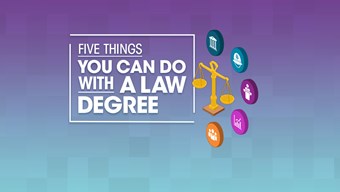Common Law Method and Ethics
This module introduces you to the English legal system and looks at how to interpret statutes and the doctrine of precedent. Also, how law is created and the structure of the English court system. These enable you to understand how laws are created and interpreted. Within Ethics, you will consider different approaches to ethical issues, including the social and ethical context of the legal profession.
Academic and Digital Skills
This module underpins all of the other modules on the LLB & MLaw. It develops the academic and digital skills which you will need for both your studies and the workplace, including using the University’s VLE and other relevant platforms and software, legal research and referencing, academic integrity, communication skills, and how to analyse and answer legal problems.
Contract Law
In this module you will consider the elements of a contract, different types of contractual terms, remedies for breach of contract and the circumstances when remedies can be excluded. You will also look at connected areas such as misrepresentation, duress, and undue influence.
The Law of Tort
Tort is a key area of law and considers acts and omissions that give rise to injury or harm to another and amount to a civil wrong. You will consider topics such as trespass to the person, negligence, product liability, employer liability, occupiers’ liability, trespass to land and private nuisance. You will also look at the remedies available when an action in Tort succeeds.
Public Law
This module looks at sources of the UK constitution and principles such as the rule of law, separation of powers and parliamentary supremacy. Also, how the lawfulness of decisions and actions made by public bodies are challenged through exploring the grounds for judicial review and the remedies available. You will learn about the place EU Law has within the UK constitution and consider the key rights and freedoms incorporated into UK law through the Human Rights Act.
Criminal Law
This module gives an overview of the criminal justice system and helps to develop an understanding of the principles of criminal liability. You will look at different criminal offences, including homicide, criminal damage, assaults, sexual offences, theft and robbery, and drugs offences. You will consider what defences may be available and the law in relation to secondary participation and attempts to commit certain offences.
Business Law 1
This module introduces you to different forms of business organisation such as partnerships and companies and how to choose the most appropriate format to run a business. You will explore company law in more detail, exploring the separate legal personality of a company and its limited liability status and company constitutions. You will look at the different parties involved in a company such as the directors and shareholders.
Critical Approaches in Current Legal Issues
Designed to further develop the academic skills which you developed during your Level 4. Equipping you with the skills which you need to succeed as you progress through the programme. Through topical areas of law, you will develop your critical thinking and evaluation skills, ability to solve legal problems, and research skills. You will be challenged through debating controversial areas of law and presenting arguments, in order to develop your ability to reflect and understand the views of others.
Land Law
We look at the nature of land, how the ownership of estates and interests in land operate and the formalities for creating and disposing of those estates and interests. It looks at important topics such as: the protection and enforcement of third party interests in land, the distinction between registered and unregistered land, trusts of land and co-ownership, leases, easements, covenants, and mortgages.
Equity and Trusts
In this module you will study the core principles of equity and trusts law which arise in a range of personal, social and commercial contexts. You will look at the distinction between a gift and a trust and how trusts are created. You will explore the management of the trust through the powers and duties of trustees and the rights of the beneficiaries before considering what remedies are available if there is a breach of trust.




















